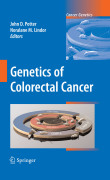
Genetic susceptibility refers to how variations in a person’s genes increase or decrease his or her susceptibility to environmental factors, such as chemicals, radiation and lifestyle (diet and smoking). This volume will explore the latest findings in the area of genetic susceptibility to gastrointestinal cancers, focusing on molecular epidemiology, DNA repair, and gene-environment interactions to identify factors that affect the incidence of GI cancers. Topics will include germline susceptibility, including Mendelian patterns of inheritance and gene-environment interactions that lead to cancer etiology. Will explore the latest findings in the area of genetic susceptibility to gastrointestinal cancers, focusing on molecular epidemiology, DNA repair, and gene-environment interactions to identify factors that affect the incidence of GI cancers INDICE: From the contents Section One – Epidemiology and Models of Colorectal Cancer. 1. Colorectal Cancer – Epidemiology. 2. Mouse Models of IntestinalCancer. Section Two – Pathways to Colorectal Cancer. 3. The Chromosomal Instability Pathway and APC Gene Mutation in Colorectal Cancer. 4. DNA Methylation in Colorectal Cancer: multiple facets of tumorigenesis. 5. Pathways and Pathology. Section Three – Germline Susceptibility – Mendelian and Other Syndromes. 6. Familial Adenomatous Polyposis. 7. DNA Mismatch Repair and the Lynch Syndrome. 8. Other Syndromes. 8.1. MUTYH-Associated Polyposis (MAP). 8.2. Familial Colorectal Cancer Type X. 8.3. Families with Serrated Neoplasia of the Colon. 8.4. Peutz-Jeghers Syndrome. 8.5. Juvenile Polyposis. 8.6. BLM mutation and Colorectal Cancer Susceptibility. 8.7. The Role of p53 in Colorectal Cancer. 8.8.Chromosomes 8q24 and 9p24: Associations with Colorectal Cancer. Section Four – Germline Susceptibility – Gene-Environment Interactions.
- ISBN: 978-0-387-09567-7
- Editorial: Springer
- Encuadernacion: Cartoné
- Páginas: 250
- Fecha Publicación: 01/01/2009
- Nº Volúmenes: 1
- Idioma: Inglés
